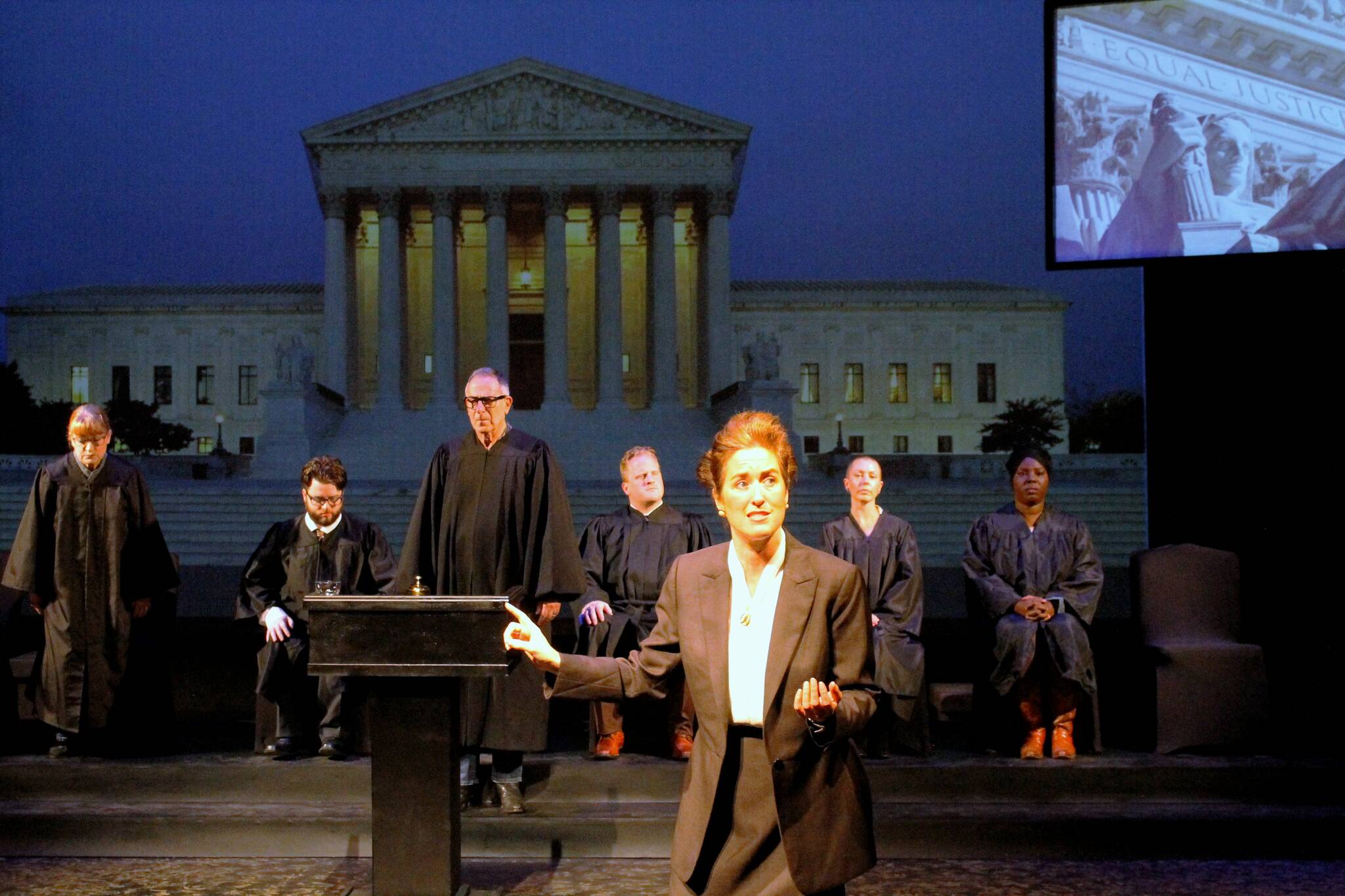Often, it’s easy to perceive a theater production as something existing in a place entirely separate from oneself. In the case of “Roe,” the newest production at Whidbey Island Center for the Arts, one doesn’t have the luxury of being far removed from the narrative.
The new show, which follows the rise and fall of the landmark U.S. Supreme Court case of the same name, opened Saturday, Oct. 8 and runs through Saturday, Oct. 22 at WICA.
The arts organization joins one of a handful of other theaters in the nation to have the rights to the current iteration of “Roe,” which has evolved since the playwright, Lisa Loomer, began working on it in 2016. The co-writer for the movie, “Girl, Interrupted,” Loomer is also an alum of Hedgebrook, the Whidbey Island nonprofit organization that offers residencies free of charge for women writers.
Set against the various backdrops of history, “Roe” serves as a tribute of sorts to the 49-year-old court case that, until this year, allowed women the right to choose. The play doesn’t shy away from the difficult and controversial subject of abortion, with one character going into graphic but necessary detail about the lengths women often went to in order to procure one before they were a safe and legal procedure. With the inclusion of a fervently pro-life pastor and anti-abortion organization Operation Rescue, the play presents feelings and opinions from the other side of the issue.
The production also follows the story of Roe herself, whose real name was Norma McCorvey. Island Shakespeare Festival veteran Helen Roundhill steadfastly portrays the many unexpected twists and turns of McCorvey’s complex life, from her attempt to get an abortion she never ended up receiving to her conversion to Evangelical Protestantism and support of the anti-abortion movement.
Roundhill initially balked when WICA announced “Roe” as its fall theater production.
“I tend to gravitate more to comedy. If laughter is the best medicine then theater has a great capacity to heal, especially in troubled times,” Roundhill said. “So I wasn’t sure I was ready to take on such a sensitive subject matter, portraying a character with such a tragic path, but I don’t back down from challenges.”
Despite McCorvey’s faults, Roundhill has fallen in love with her story and has appreciated the opportunity to advocate for her, in a small way.
Katrina Collins Bentsen of South Whidbey plays Connie Gonzalez, McCorvey’s girlfriend and later, platonic partner. Collins Bentsen takes the stage along with her youngest daughter.
“On a process note, I’ve never played a role like Connie, so diving deep on the stage as I do with her is new, but not personally foreign — she loves deeply, and is exposed to a part of society that refuses to acknowledge her. It’s painful,” she said. “Connie is not a character in a play — she was a living, loving person and I take my time on the stage very seriously as I work to honor both her memory, and all who connect with Connie’s story.”
Langley resident Teresa Hess plays Sarah Weddington, the attorney who, at 26, argued Roe v. Wade. Though their two stories are irrevocably intertwined and often compete for attention throughout the play, McCorvey and Weddington led vastly different lives. The disparity in their socioeconomic backgrounds is highlighted, especially when it is revealed that Weddington herself was able to afford an abortion outside of the country. For McCorvey, this wasn’t an option.
Throughout the play, characters have the opportunity to initiate conversations that perhaps didn’t happen in real life – but this is about the only time during “Roe” that fiction enters the picture. Aside from being an informative history lesson, the show feels deeply emotional and personal in this post-Roe era.
The cast, which includes two children, is a mix of Whidbey natives and talent from the greater Seattle area. Alongside Roundhill, Collins Bentsen and Hess, Julie Boren, Jacq Babb, Abie Ekenezar, Gail Liston, Lexi Warden, Miles Harrison, Zachary Schneider, Jeff Natter, Layla Akhtar and Kaia Bentsen play a number of different roles throughout the production.
Deana Duncan, executive artistic director of WICA, said Loomer delivered new opening and closing monologues for “Roe” just four weeks ago, in keeping with changing times.
“The fact that this playwright stays on top of current events and updates the script as needed to stay relevant is stunning,” Duncan said. “Lisa wrote our director and actors on opening night, reminding us that at its core this play is about choice.”
Director Rose Woods felt drawn to the play, even though the material proved difficult to navigate.
“My greatest challenge as a director with this script is the potent desire to bring the playwright’s words to life. It is a complex story that travels back and forth through time with themes that are not easy to digest,” Woods said. “The research was challenging. The technical and design aspects alone were daunting. But the visceral human experience of these characters has been the most powerful aspect of this process.”
Duncan believes WICA is the first theater to launch a full production of the script.
“We know this work is controversial, and we believe that great art will always raise the hardest of questions,” she said. “As a part of our national dialogue, this play is worth seeing and supporting.”
“Roe” performance times are at 7:30 p.m. on Oct. 13-15 and Oct. 20-22 and 2 p.m. on Oct. 16. Ticket prices vary.
For more information or to purchase tickets, visit wicaonline.org.



